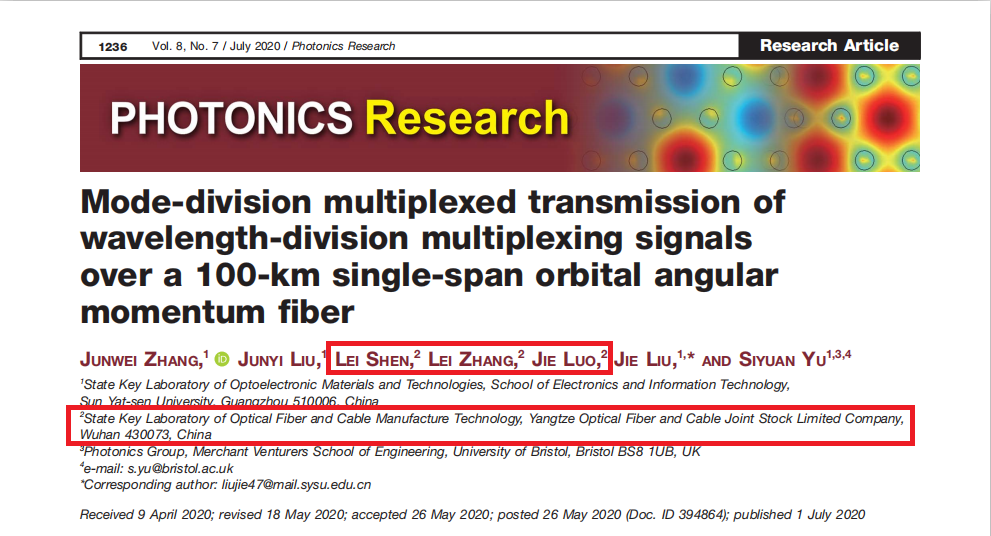
On July 1, 2020, the team of Associate Professor Liu Jie and Professor Yu Siyuan from the School of Electronics and Information Technology of Sun Yat-sen University and Yangtze Optical Fibre and Cable Joint Stock Limited Company (YOFC) (Stock Code: 601869.SH, 06869.HK) jointly announced the first repeaterless communication system experiment over a 100-km single-span orbital angular momentum (OAM) fibre. The relevant research results were published in Photonics Research (a Chinese optics journal run by the Chinese Academy of Sciences) in the 7th issue of 2020, and were selected by the Optical Society of America (OSA) as the Spotlight on Optics.
As the Internet, cloud computing, and the Internet of Things are in full swing, the demand for network bandwidth has been unprecedentedly great in the information society. . Subject to the limitation of non-linear effects in single-mode fibre itself, "bandwidth exhaustion" may be expected in a foreseeable future. Therefore, space division multiplexing emerges as a response.
Space division multiplexing refers to the multiplexing technology that establishes multiple partitionable spatial data channels with a single optical fibre. It multiplies system capacity and spectrum efficiency, and is considered one of the key technologies for building optical networks in the future. At present, space division multiplexing can be supported by optical fibres such as few-mode fibre, multi-core fibre, and photonic crystal fibre. Among them, drawing and connection of multi-core fibre is quite challenging; photonic crystal fibre features extremely low dispersion and theoretical attenuation, but remains high in actual attenuation; few-mode fibre has become the primary choice in application of space division multiplexing, thanks to its low loss, straightforward drawing, high fusion-splicing efficiency, and the adaptivity to the various complicated external environments. Space division multiplexing technology based on few-mode fibre has demonstrated great potential in increasing the transmission capacity of single-fibre communication systems, making it possible to increase the capacity by dozens of times, and providing an effective approach to address the capacity bottleneck of future optical communication systems.
Photonic OAM fibre is one of the few-mode fibres. OAM-based single fibre mode-division multiplexed multi-channel transmission is a new method proposed in recent years to significantly expand the capacity of optical fibre communication. Sponsored by China's National Key R&D Program "Research on the expandable ultra-large capacity new space-division/mode-division multiplexing optical fibre communication technology" (program number: 2018YBF1801800) of the Ministry of Science and Technology, Dr. Shen Lei and his team of YOFC developed and manufactured a low-attenuation long-distance ring-core OAM fibre based on the unique PCVD process of the Company. With a fundamental mode attenuation being as low as 0.198 dB/km, this fibre creates a world record in the field of OAM fibre.
At the same time, the program team also leveraged the special mode grouping characteristics of the new OAM ring-core fibre with ultra-low inter-mode crosstalk, and proposed that a new architecture of OAM mode division multiplexing system for multi-channel transmission can be implemented by applying only a small-scale (4x4) modular multiple-input multiple-output (MIMO) equalization algorithm on the receiving side. The complexity of the equalization algorithm for the unit transmission capacity of this architecture does not increase as the communication capacity does, enabling it to be extremely scalable and practical.
Based on the above-mentioned new system architecture and new ring-core OAM fibre, the team conducted large-capacity optical information transmission experiments over long distances, and successfully implemented a single-span repeaterless 100-km OAM optical fibre communication link for the first time. With only two 4x4 MIMO equalization modules, this link enables mode division multiplexing of 8 OAM mode channels. Each mode channel simultaneously transmits 10 wavelength division multiplexing/polarization multiplexing/quadrature phase shift keying (QPSK) optical signals that are completely compatible with the existing optical fibre communication technology. This means that the link realizes parallel transmission of 80 optical signals over a single fibre, reaching a total transmission capacity of 2.56 Tbit/s, a spectral efficiency of 10.24 bit/(s·Hz) and a capacity-distance product of up to 256 (Tbit/s)·km, thereby setting a new record in OAM optical fibre communication.
With the proposal of low-loss, ultra-low crosstalk OAM fibre, the OAM mode multiplexing technology based on the ultra-low inter-MG crosstalk and modular 4*4 MIMO is promising in improving the single-fibre capacity, and is considered the optimal choice for the next generation of new optical communication system.
For more than three decades, YOFC has always been focusing on core technology and independent innovation, and has made the great strides from the initial technology cooperation to the current self-innovation. After years of development in the independent innovation system, YOFC now boasts the only state key laboratory in China's optical fibre and cable industry, and is the only company in the industry that has won the second prize of National Science and Technology Progress Award for three times. YOFC has mastered the core technologies that need to be secured in our hands. It has shifted from an "industry follower" to an "industry leader".
Guided by the mission of "Smart Link Better Life", YOFC will continue to be innovation-driven and push forward the industry development with advanced expertise, technology and equipment. YOFC will also play a part in China’s stronger and leading optical communications industry and make unremitting efforts to build China into a leading power in science and technology.
-
2025.12.31A New Chapter, Built for the Future
-
2025.09.12YOFC Showcases Diverse End-to-End Portfolio at CIOE 2025
-
2025.06.19YOFC Unveils “AI-2030” Strategy to Drive the Next Generation of AI-Ready Optical Infrastructure
-
2025.04.30YOFC Releases 2024 ESG Report, Advancing Innovation with Purpose and Responsibility
-
2025.04.28New Breakthrough! YOFC Multi-mode Fibre Achieves 212G VCSEL High-Speed Transmission
